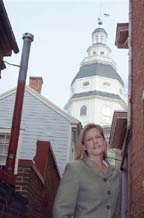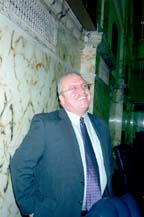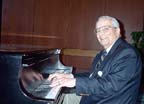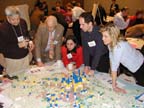The Year That Was 2005: January - May
The Times of Our Lives — We began 2005 by jumping into cold water. You’ve traced with us where we’ve gone from there: Struggling to save the Bay as we crowd around it … seeking our destinies … writing songs about love … striving to sustain our ecosystem … revitalizing our farm heritage … exposing ourselves to art … making movies and magic … studying nature on her terms … cruising in classic cars … pushing our limits … celebrating the season of hope.
People — Ballerinas and big timers … artists and aspirants … politicians, poets, playwrights and psychics … musicians, maestros and mayors … storm chasers, fox chasers and mosquito chasers … boat captains, builders and brokers … storm water managers and midshipmen … pioneering women and persevering athletes … memoirists and motorcycle riders … gospel singers, rocket scientists, security guards and war refugees.
Places — High-rising small towns … historic Annapolis and Solomons Island … the places we call home … the museums that preserve our history … Chesapeake and Atlantic islands … a little lake with a mission … regional and Out of the World trails … pet-friendly destinations … Mr. Maryland’s preserved office.
Creatures — From water, land and air: oysters and crabs aplenty, including horseshoes … rockfish … seagulls … amphibians … bees, butterflies and songbirds … even invasive alien flora.
Boating — Buying and naming a new boat … dream boats … good boating manners … racing in fast and slow time … watermen’s rodeos … dangers on the sea … The Volvo Ocean Race 2006.
Legislation 2005 — Much of what was done in 2005 is likely to be undone in 2006.

Changing Lives
How an artist, a percussionist and a chef veered off the straight and narrow … and onto success.
As the new year commences, we’ve tracked down three Chesapeake neighbors who have dreamed and dared. Art apprentice Rick Casali, personal chef Terry Antoniuk and percussionist Elizabeth Melvin veered off the straight and narrow.
Taking leaps of faith, they are following their bliss to real world success. Take a glimpse into their lives as you take stock of your own this new year.
Paula Anne Delve Phillips • No. 1: Jan. 6

Up, Up and Away
Skylines and prices rising in Twin Beaches
In both North Beach and Chesapeake Beach, the new year sees a coming of age with a changing skyline and high-rise condominiums with Washington price tags.
Carol Swanson • No. 1: Jan. 6

Time Travel Eased in Capital City
21st century history museum underway in Annapolis
In historic Annapolis, you’ll soon be able to time travel with ease. Near City Dock, Historic Annapolis Foundation is reshaping a 1790s’ building into a new history center that will be Annapolis’ history central come the spring of 2006.
Carrie Steele • No. 1: Jan. 6

Calvert’s New Delegate Takes Her Desk
17-hour special session gives Kullen a taste of what’s to come
On the House floor, Dec. 28 was an early first day of school for freshman Sue Kullen, who took her seat as a Calvert County delegate in the special legislative session on malpractice insurance reform.
The session — which lasted 17 hours — gave Kullen a glance into what’s in store as the General Assembly convenes for its regular term. “I loved seeing the process,” Kullen said. “I’m a lot smarter now.”
Carol Swanson • No. 1: Jan 6

Bay Weekly Interview: Gov. Robert Ehrlich
On the environmental front, he claims a very good year
To the question Is there a short list of reasons why Marylanders should elect you to a second term? Gov. Ehrlich responded:
“We’ve just completed a study of promises and commitments we made to people in our campaign and where we are on them. We made 101 promises — on policy issues, taxes, education, restructuring government — and we’re going to do a midterm report.
“We’re a work in progress. But so far we’ve lived up to about two-thirds of what we promised. We’ve done a lot. This past year in particular was good, very positive, on the environmental front. It was a very, very good year.”
Sandra Olivetti Martin • No. 2: Jan. 13

Bay Weekly Interview: Delegate Anthony O’Donnell
Calvert’s outspoken Republican cracks the whip
To the question As whip are you also your party’s lash against the Democrats? Del. O’Donnell responded:
“To say I lash out is the wrong characterization. Part of my job is to be a spokesman for my party, to be firm, to be principled and to be the voice of opposition.
“There’s a lot of animosity with the current leadership in both houses of the General Assembly.
“I think that combined, Speaker Busch and Senate President Mike Miller are perceived as the mirror-image bookends of obstructionism.”
Sandra Olivetti Martin • No. 2: Jan. 13
Anne Arundel’s January Greeting: ‘Dear Legislator’
Everybody who wants a law is making a list
Santa has handed off the job, and now it’s legislators who are getting everybody’s list. If you’ve got a wish, these are the days to whisper it in your senator or delegate’s ear.
Carrie Steele • No. 2: Jan. 13
Environmentalists huddle for a winning 2005 season
There were no jumping jacks, stretches or lunges at the 11th Annual Environmental Legislative Summit. But environmental groups were warming up all the same for a season of green legislation.
On land, the Summit targeted three policies for defeat:
• re-allocation of Project Open Space funds;
• selling of public lands;
• under-funding of state land conservation programs.
Carrie Steele • No. 2: Jan. 13
A Royal Flush
Chesapeake Bay dealt winning hand with new nutrient limits
Two dollars 50 cents is a small price to pay for big changes.
Since the first flush of the new year, you and all your Maryland neighbors have been helping make big changes. You’re sending $2.50 each month flowing toward Bay restoration.
Your money will so purify our wastewater that oysters may better breathe and Bay grasses may again flourish.
Carrie Steele • No. 2: Jan. 13
Are You and I Disappearing from Maryland’s Public Spaces?
It’s a splotchy map, Maryland’s excess public land, with odd-shaped, patterns splattered like red ink drips. We’ve seen the lands-for-sale stories and heard the uproar. But what’s really at stake?
Carrie Steele • No. 3: Jan. 20
Firing up for Big Responsibility
New Chief Blackwell earns an A and a portrait
No more sliding down firepoles or riding a blaring fire engine. No more fire helmets, smoky evenings or hooking hoses to hydrants.
But that’s just fine with Ronald Blackwell, Anne Arundel County’s newest and first African American fire chief.
Carrie Steele • No. 4: Jan 27
Pushing it to Extremes
The long fall of Bruce Bereano
In Annapolis, the name Bereano is synonymous with trouble. The 59-year-old lobbyist has been convicted of a felony, disbarred and, last month, nearly kicked out of the game. Through it all, he insists he’s a wronged man.
Sandra Olivetti Martin • No. 5: Feb. 13

Dixieland Is This Doctor’s Prescription
Musical heartbeat strong for 76-year-old physician
To Dr. Richard Hochman, an internist at Anne Arundel Medical Center, Dixieland jazz is just what the doctor ordered.
“It’s the most basic form of jazz,” says the namesake member of Dr. Hochman’s Dynamic Dixieland Band. Hochman was drawn to the improvisational style as a boy rebelling against the strict piano teacher, followed it halfway around the world and has stayed with it through a lifetime of healing the sick and raising a family.
Carrie Steele • No. 5: Feb. 3
For 2,700 Marylanders, the Lure of the Beach Knows No Season
Plungers raise record $625,000 for Special Olympics
For some, it’s never cold enough to stay away from the beach.
Walt Wieczockowski stood alone, rosy and still on the frigid orange sands of Sandy Point State Park January 29.
This may not seem the behavior of a sane adult, but Wieczockowski represented relative sensibility in comparison to many of the 2,700 other polar plungers who helped the State Police to bring in a record $625,000 for Special Olympics.
Ted Daly • No. 5: Feb. 3
Holding Back the Waters
Ted Neuman keeps our stormwater — but lightning keeps its own counsel
Lightning strikes, ice-overs, surging waters and invading plants are all part of Ted Neuman’s job.
That job is stormwater management, and Neuman’s three-year-old Tymatt Industries thrives on the simple law that water flows downhill.
Balancing physics, engineering and the laws of nature, Neuman slows the flow of millions of gallons of water from rushing into the Bay after every rainstorm, helping to preserve water quality in Bay waters and tributaries.
Carrie Steele • No. 6: Feb. 10
They’re Writing Songs About Love
How Chesapeake musicians woo, win and weep
“The love song will never die. It is the one universally relatable topic,” says Rob Timm the afternoon drive DJ of WRNR 103.1fm in Annapolis. “If you look at popular music, a very large portion of what’s out there is love songs, and the most beautiful among them, whether Cole Porter or Elliott Smith, stand the test of time.”
Ted Daly • No. 6: Feb. 10

Move Over: Two Million More People Want In
Tackling population growth stacking LEGOs
By the time millennial babies are having families of their own, two million more people will surround the U.S. Capitol, sprawling all the way from the Blue Ridge to Chesapeake Bay. It’s going to get pretty crowded.
Planners who’ll be retired by 2030 are already at their wits’ ends as they try to make room for the multitudes to come. The challenge is so daunting that it sent some 300 of them reverting back to childhood last week.
There they were, a room full of elected officials and community, environmental, housing and business leaders, all playing with yellow, blue and white LEGO building blocks.
Carrie Steele • No. 6: Feb. 10

Footworks
Stomping a folk ballet of America’s many rhythms
When they hear the call of the ever-present fiddle, the lifeblood of clogging music, Footworks dancers will whirl, jump and pivot. Eileen Carson-Schatz’s troupe fuses many cultural styles, such as clogging, tap and step dancing, into a folk ballet of America’s many rhythms. They have traveled to festivals in Scotland, England, Japan, Canada and 35 American states. They travel far and wide, dancing in at least 17 of the 23 Maryland counties, across the country, in Canada and abroad. But they call Annapolis home.
Paula Anne Delve Phillips • No. 7: Feb. 17

Grapes Take Root Where Tobacco Once Grew
With vintage 2004, Southern Maryland turns wine country
Making wine was Tim Lewis’ hobby when he worked at Patuxent River Naval Air Station. When Lewis was laid off, he looked at his hobby in a new way.
“I had friends and family who had said how much they liked my wines,” Lewis said just over a year later while walking the frozen fields of Cove Point Winery and Vineyard, where he has staked his future.
Under Lewis’ care, grapes are now colonizing Maryland’s earliest settled lands, where tobacco ruled for centuries.
Carol Swanson • No. 7: Feb. 17
Mikulski Asks U.S. Senate to Save Our Crab Cakes
Seafood processors and other seasonal businesses could get help under her bill
Seafood processors and other specialty seasonal Maryland businesses will get water wings to help them stay afloat this summer if Sen. Barbara Mikulski has her way.
A feisty Baltimore native who knows her crab cakes, Mikulski explained to the U.S. Senate how family seafood businesses can’t find enough American workers to pick crabs and shuck oysters. So they rely on seasonal foreign help with special visas.
The H-2B visa program lets employers hire temporary foreign workers when no American workers are available. But the program can bring in no more than 66,000 workers per fiscal year. This year’s quota was reached back in October.
M.L. Faunce • No. 8: Feb. 24

Artist on the Threshold
Derrick Booth is custodian by day, image-maker by night
Derrick Booth is on the clock, so he can’t stay. But his love of art lures him each week to the classroom at South County Senior Center in Edgewater, where he works as a custodian.
Learning the visitor was an artist, painting instructor Paula Fink asked him to bring in his works. What he showed Fink and her class surprised them.
Carrie Steele • No. 8: Feb. 24
Treasure Chests of Black History
Maryland’s African American heritage gets a double boost this spring
Come spring, you’ll find two new ways to get acquainted with Maryland’s African American heritage, both the struggles and the victories. You’ll get inspired by famous Maryland figures — like Harriet Tubbman, Thurgood Marshall, Benjamin Banneker, Frederick Douglass, Leon Day, Eubie Blake and Billie Holiday — and their successes in the face of opposition.
The storytellers are Baltimore’s new Reginald F. Lewis Museum of African American Heritage and the expanded Banneker-Douglass Museum in Annapolis.
Carrie Steele • No. 8: Feb. 24
New Bay Rx: Finish What We Start
Existing programs, better monitoring might do wonders, scientists say
When scientists get together to talk about the Bay, they don’t waste words. In these days when chronic wasting disease on the Bay side meets chronic penury on the dollar side, they’re not asking for more money. They’re not even asking for much more science. They’re asking that what we start, we finish.
Sandra Olivetti Martin • No. 8: Feb. 24
The Maryland General Assembly’s 90-Day Romp
Seven bills that could change your life
From minimum wage to the species of oysters living in the Bay, once again this year the General Assembly is debating laws that could change the quality of our lives and our ecosystem.
Among the big ones: raising minimum wage by $1 to $6.15 an hour; extending the ban on smoking in workplaces to bars and restaurants; legalizing slot machines.
The legislature could also decide on other key issues, including revising its December look at medical malpractice insurance, capping tuition at state universities, preventing identity theft and preventing price gouging when the next natural disaster hits.
Debra George Siedt • No. 9: March 3
Art Builds Better Neighborhoods
Calvert Artists Showcase makes new friends over good music
Pat Willis is no stranger to Calvert County; he’s lived there 23 years. Jason Brown is a newcomer, only three years in Calvert.
What do these two men have in common? They’re both talented musicians who’ll share the stage with each other and six more local acts — some familiar faces along side some new friends — at the annual Calvert Artists Showcase.
Each year, the revue showcases Calvert County’s brightest stars and supports local do-good groups. In six years, the Showcase has distributed over $250,000 to local non-profits, each handpicked by the featured artists.
Margaret Tearman • No. 9: March 3

Bay Weekly Interview: U.S. Congressman Wayne Gilchrest
Chesapeake Bay’s man with a plan
About wayward Chesapeake Bay, Congressman Wayne Gilchrest is a man with a plan.
At 21 years old, the Chesapeake Bay Agreement — whose job it is to put the Bay back on track — is too much like a kid old enough to amount to something but going nowhere fast. Gilchrest, a former high school teacher whose three children are now older than the Bay Agreement, knows a thing or two about moving past adolescent inertia.
Now, Gilchrest, an unconventional Republican, is trying to push Chesapeake Bay restoration out of idle.
Sandra Olivetti Martin • No. 10: March 10

Keeping that Big Band Sound Swinging in the 21st Century
Doc Scantlin and His Imperial Palms Orchestra tour the world, but he and his wife Chou Chou call Chesapeake Country home
Dressed in black from his spats to his tails, the bandleader playfully taps his baton in the air as he weaves behind the microphone, part maestro, part entertainer. Doc spins to address the audience with full grin and eyes lit. The 13-piece orchestra behind him belts the Louis Prima classic, “Sing, Sing, Sing.”
In the 21st century, Doc Scantlin and His Imperial Palms Orchestra preserve the big band essence. Playing in and around Washington for more than a decade with performances at supper clubs, society balls and weddings, they’ve won the Washington Area Music Association’s Best Big Band award three times and have been praised by Forbes magazine writer Jeff Turrentine as the Best Band in the Country.
Jennifer Moreland • No. 11: March 17
Bay Weekly Takes Home Prizes
Oysters and shad make winners of writer and columnist
Writers from Maryland and beyond were crossing their fingers last week for a chance to win the MDDC Press Association’s 2005 editorial awards.
M.L. Faunce won first place in the business/economics category for “Stewin’: Despite Dismal Health, Native Virginica Oysters Are Still Caught and Served in Chesapeake Country” (Vol. 12, Issue 47). Additionally, her story earned Best in Show.
The Best in Show award picks from the pool of all first-place winners in a given category. In claiming the prize, Bay Weekly’s first Best of Show ever, Faunce beat out papers large and small that won first in the category, including The Baltimore Sun and The Capital.
Bill Burton won a second-place prize for sports columns in Bay Weekly’s division. That’s the most recent of hundreds of awards Burton has taken in a journalism career spanning seven decades.
Carrie Steele • No. 11: March 17
Winning Prizes for Our Advertisers
Besides building business, Bay Weekly ads collect awards
This year, the Maryland, Delaware, D.C. Press Association recognized Bay Weekly’s advertising with six awards in the division for non-dailies with circulation over 15,000.
What’s the secret to an award-winning ad?
“Great artwork and a catchy headline,” answered Bay Weekly production manager Kehne. “It doesn’t always come together, but when it does, the ad grabs your eye as soon as you turn the page. Or it makes you stop reading a story mid-sentence and look at the ad.”
Carrie Steele • No. 11: March 17
Governor’s Green Report Card Wilts
There’s room for improvement, says environmental group
The word midterm may be striking anxiety into the hearts of students in their spring semesters. It’s not just students this time who are up for a grade: Report-card time on State Circle put Gov. Robert Ehrlich under the magnifying glass last week.
The Maryland League of Conservation Voters released its midterm scorecard for Gov. Robert Ehrlich’s four-year term. Computing the grade for January 2004 through December 2004, the League reviewed eight categories — air quality, water quality, energy, fisheries and wildlife, smart growth, transportation, land preservation and open space plus administration and appointments.
His composite grade: D+.
Carrie Steele • No. 12: March 24
Alien Oysters Won’t Get Their Passport Stamped This Year
Legislation a vote for ‘sound science’
Here’s something Maryland’s General Assembly and its governor can agree on: emergency legislation postponing the commercial introduction of alien oysters into the Bay watershed.
M.L. Faunce • No. 12: March 24

Monsters Lurk in the Depths
But if you catch one, let it go!
Why would anyone bother to go out on the Bay in late winter to catch fish, only to let them go? Such a sport may seem counterintuitive to longtime Bay residents.
The notion that fish can provide this enjoyment without being harmed has brought new fishers to the sport.
“A lot of these people don’t keep fish in any season,” Dahlberg said of those fishing the Flats.
Ted Daly • No. 12: March 24
Taxes Are Certain, But Fees May Not Be
Will Navy poke a federal loophole in Maryland’s flush tax?
Apparently Benjamin Franklin was never introduced to a fee — another word for payment that is causing problems for the Maryland Department of the Environment, the U.S. Navy and the Bay.
Under federal law, the Navy is exempt from paying taxes, which is what it claims Maryland is trying to charge.
Debra George Siedt • No. 12: March 24
Driving on the Road to the Future
With hybrids taking off, fuel-cells and alternative-fuel cars may not be far behind
In less than five years, hybrid cars have staked a small and growing claim on Maryland’s byways. Now other technologies, like compressed natural gas-powered cars, ethanol-powered cars and fuel-cell cars, are the debutantes of the road.
What’s steering our vehicle evolution? The ignition is sparked by two problems: air pollution and oil dependency.
Carrie Steele • No. 12: March 24

Chasers
Are natural-phenomenon chasers are just plain crazy. Or do they know something we’re missing?
While many people believe natural-phenomenon chasers are just plain crazy, others recognize that the obsession brings the natural rush of experienced live and in living color. In an age where televisions, MP3 players, computers and video games are the entertainment of choice, chasing hurricanes, tornadoes and eclipses seems, well, primitive. These chasers, however, know that no virtual reality can take the place of actually seeing an eclipse, feeling the wind from an F5 tornado or collecting data from 40,000 feet above a hurricane’s eye. It’s a reality that is difficult to find, but as these chasers will tell you, once they catch it, the very next question is, when are we doing this again?
Debra George Siedt • No. 13: March 31
Poetry Loves Company
Local poets get together to perfect their passion
Local poets say that listening to your inner muse is only the beginning of writing the perfect poem. Sharing poetry with other poets is the second step in the quest for perfection. “It’s a night to work and improve,” says Rocky Jones of Prince Frederick Library’s monthly Poets’ Corner. “There is always a positive energy; people share constructive criticism.”
Poems are short but not quick, agrees Shirley Brewer, the resident poet at 333 Coffeehouse, the monthly third-Friday performance venue for local folk bands and poets at the Unitarian Universalist Church of Annapolis.
Dawn Kittrell • No. 13: March 31
Where Do Old Computers Go When They Die?
Recycling catches up with the electronic age
If you’re like over half of American households, there’s an old computer gathering dust in your closet, attic, basement or garage. If you’ve tried to recycle, you’ve likely found that computers, cell phones and monitors are unwanted.
That’s why Elizabeth Wilmot, who’s found herself in just such a conundrum, now does business as Turtle Wings.
Carrie Steele • No. 14: April 7
The Sailing Life
Volvo or not, Annapolitan Jan Majer’s heart is set on racing
The blood of Jan Majer [say Yan Mayer] may be a tad saltier than the average 25-year-old American.
So salty is Majer that he was chosen from more than 5,000 young American sailors to compete for a crew position in the 2005-2006 Volvo Ocean Race.
Alice Snively • No. 14: April 7
Rite of Spring Unites Oldtimers and Newcomers over Horses and Food
Family’s Roedown traditions at the Marlborough Hunt Races
Among the heirlooms people inherit from their parents, a parking spot is not one that immediately springs to mind. But for Marcia Handrick, her inherited tailgating spot at Roedown is a ticket to tradition. For the last 31 years, the Handrick family of Calvert County has gathered in all kinds of weather on the occasion of a horse race that’s become a rite of spring.
Louise Vest • No. 14: April 7
One Woman Fights the System
As chief of the U.S. Park Police, Teresa Chambers was at the top of her game.
Now she won’t rest until she’s cleared her name, restored her honor and reclaimed the job from which she was exiled in November, 2003.
Margaret Tearman • No. 14: April 7
Wrapping up the 2005 General Assembly
What little’s been done is likely to be undone
Marked by political wrangling, this year’s session skirted several major issues, including stem cell research, slots, medical malpractice and taxes. As senators and delegates pack up their bags until next year, Gov. Ehrlich is preparing to undo some of their hard work via executive vetoes.
Debra George Siedt • No. 15: April 14

Pondering a Pond
The joys of a garden pond far exceed the hard digging and regular upkeep that go into creating an oasis-like ecosystem
“Mix a little foolishness with your serious plans,” advised the Roman poet Horace. “It’s lovely to be silly at the right moment.” In that mood my 15-year-old son, Aaron, and I agreed to make a pond in the back yard.
If you’re entertaining such an addition yourself — or pondering the wisdom of such an endeavor — my experiences over the past eight years may help. Join me for a deeper look into the quagmires that can await the unwary hobbyist.
Janice F. Booth • No. 15: April 14
The Grass Is Always Greener on the Other Side of the Fence
But you can grow a luscious lawn that’s good for you and the Bay, too
Spreading chemical fertilizer on my lawn goes against my desire to preserve the marshes and creeks that feed our precious Bay. Then I started thinking. Does my lawn really need fertilizer?
Maureen Miller • No. 15: April 14

Holding Up This Good Earth
To celebrate Earth Day’s 35th birthday — and Bay Weekly’s 12th — we offer a week’s worth of ways to tread more lightly on Mother Earth
If you’re like us at Bay Weekly, Earth Day renews your optimism that one by one, year after year, we can channel our will into energy and into a sustainable reality for generations to come.
Here are seven ways to start off a day at a time, then a week at a time, toward the future today.
1. Experiment with Alternative Fuels
2. Warm Your Home with the Sun
3. Enlist Mother Nature to Help with Your Heating and Cooling
4. Reduce Your Impervious Surface
5. Use Greener Cleaners
6. Concentrate Your Political Clout
7. Reward Your Good Work with Energy Credits
Bay Weekly staff • No. 16: April 21
Around-the-World Race Headed for Annapolis
Our sailing capital remains on the Volvo map
The million-dollar, break-neck-speed sailboats won’t hoist their sails until early November. They won’t spot Annapolis on the horizon until April 19 of 2006. But our self-styled sailing capital of the world remains on the map.
Carrie Steele • No. 16: April 21
Where Have All the Songbirds Gone?
It’s survival of the fittest — and the luckiest — as adapters abound and the displaced disappear
Songbirds in Bay Country face many obstacles. Locally they must contend with loss of habitat and cowbirds invading songbird nests to lay their eggs. Birds that migrate face additional problems, such as loss of stopover and winter habitats, including, for some species, the destruction of the tropical rain forests.
Many songbird populations are in decline, but not all.
Vivian I. Zumstein • No. 16: April 28
Putting Corn to Work
For chicken feed, you can heat your house with chicken feed
Plink, Plunk. Whirr, Whoosh.
That’s the sound of the cornstove heating your living room with chickenfeed for chickenfeed — four cents a pound — about half the cost of a hardwood fire. The yellow corn kernels are clean, easy to handle and the cheapest, cleanest-burning solid fuel you can find.
Bruce Allen Bauer • No. 16: April 21
Crab Update
On a cool April evening while both the Baltimore Orioles and the new Washington Nationals were playing baseball, Sen. Barbara Mikulski went to bat. The Baltimore native came out swinging on the floor of U.S. Senate “determined to get a vote” on an amendment to help save small and seasonal businesses.
The short senator from Maryland indeed got a big hit. Her amendment passed the Senate by a vote of 94-6.
M.L. Faunce • No. 17: April 18
Everything Changes
A Memoir of New Motherhood
When I became a parent, I had no idea how much everything would change. I thought I’d continue to work, continue to go on long vacations and continue to have the freedom to do everything I wanted.
Debra George Siedt • No. 18: May 5
Masquerading Midshipmen
For future officers, theater isn’t just about putting on a good show
Senior midshipman James Flynn is one of some 40 Masquerading Midshipmen who devote spare time to the dramatic muses writing, setting, lighting, acting, directing and producing plays. The mids aren’t trying to make it on Broadway, for Masqueraders is about more than putting on a good show. It’s also about developing skills that help make good officers.
Beverly Hill van Joolen with Carrie Steele • No. 18: May 5
The Buzz and Battle for Utopia
As mosquito season returns, so do mosquito fighters
Cyrus Lesser, chief of the state’s mosquito control program and a working entomologist since 1976, blames his father for his fascination with bugs.
Nowadays, supervising 20 mosquito suppressors, 60 trucks and two mosquito-spraying aircraft fills more of Lesser’s day than hand-to-hand combat with winged predators.
Debra George Siedt • No. 18: May 5
Mr. Maryland’s Office Still Open
And you’re invited to visit
If Mr. Maryland could rise from the grave, he could go to work today.
Louis Goldstein rose to become Maryland’s favorite son. For close to 55 years, he served Calvert County and Maryland. Elected comptroller in 1959, he kept the job for 39 years.
Now Goldstein’s office has been transported lock, stock and barrel from the Maryland Treasury building in Annapolis to the Jefferson Patterson Park and Museum Visitor Center.
Becky Bartlett Hutchison • No. 18: May 5
Out of Season, Not Out of Mind
Native oysters on Congress’ summer plate
This week the House Committee on Resources held a hearing on whether the Eastern oyster should be listed as an endangered species.
It won’t, because it’s not endangered in all areas of its range. But the hearings could give our oysters more political clout, said committee member and Maryland congressman Wayne Gilchrest. Such hearings also raise awareness, and that, he said, could “enhance the idea for more sanctuaries in the Chesapeake.”
M.L. Faunce • No. 19: July 21

As the War Ended
On a warm day in the early part of May 1945, I woke up just before dawn and knew that things were different…
I had just turned eight when World War II ended. My family was interned in a small POW camp on the Mecklenburger Bay in the German port city of Luebeck.
Why tell this story now, 60 years after the fact? The world has changed a great deal in the last 60 years yet humankind’s inhumanity hardly at all.
I want to tell this story now to acknowledge the suffering of the oppressed and the sacrifices of the Allied soldiers who liberated Europe.
I want to tell this story now because I survived to learn those lessons and live all over this great country…
Eugene Melnitchenko • No. 19: May 12
Class of 2005 Greets Pioneers of 1955
A half century ago, women integrated St. John’s College
Last year, three college seniors discovered the class of 2005 is the 50th St. John’s class to include women. They wanted to meet the women of 1955 — the first class of women — to share meals and talk and to find out what it was like to be a pioneering woman at an all-male school.
Erica Naone • No. 19: May 12
Uncommon Courtesies
Helping fellow fishers out of trouble
In more than 60 years of fishing and communing with the gulls, one thing still bothers me: that’s when a fisher cuts the line after snagging a gull or other seabirds. I’ll never understand this. The birds are part of the magic of fishing, and they have the right to fish with us. These are not landfill gulls. They and their tern friends (the best fishers on the water) work for a living. Hell, they were here first. When the gulls are around, you can feel the excitement. And when you find a blitz of fish feeding on the surface, the gulls are telling you This is gonna be a good day. So when we cause them trouble, we should make the effort to help them out.
Larry Fogel • No. 20: May 19
The Blues are Back … But that’s Nothing to Cry About
Chesapeake Blues Festival returns to Sandy Point State Park
Chesapeake Country cultivated its taste for live blues during the five-year run of the Chesapeake Bay Blues Festival, beginning in 1998. Then, in 2003 and 2004, the festival scaled down, and we went hungry. Now we feast again as the Chesapeake Bay Blues Festival returns to Sandy Point State Park.
Paula Anne Delve Phillips • No. 20: April 19
Buying Our First Boat
How one couple navigated this Chesapeake initiation
Before we even looked at a boat, we set a price. I set my final-you’re-not-getting-a-boat-for-more-than-this-amount, knowing that if he found a boat for a little more, I’d bend. Thus the hunt began.
Debra George Siedt • No. 21: May 26
From the Wings of a Butterfly
Learn a few distinguishing features, and you can identify 10 Chesapeake butterflies
Friends visiting over a cup of coffee in my garden remark in amazement when I point out butterflies by name. But I’m no expert. It really isn’t hard. Learn a few distinguishing features, and you can identify many common butterflies. You just need to know what to look for. My friends often leave knowing how to tell an eastern tiger swallowtail from a zebra swallowtail.
Vivian I. Zumstein • No. 21: May 26



















